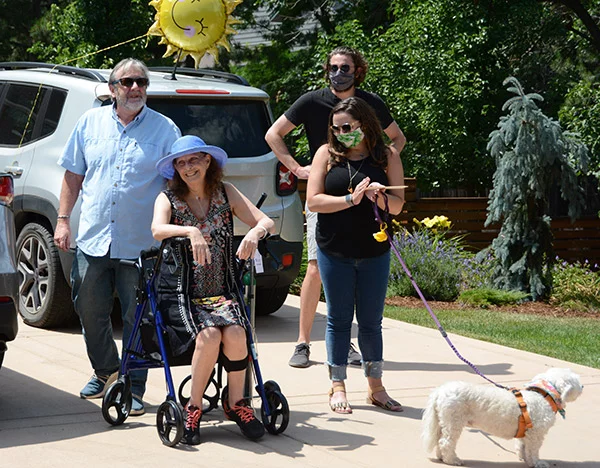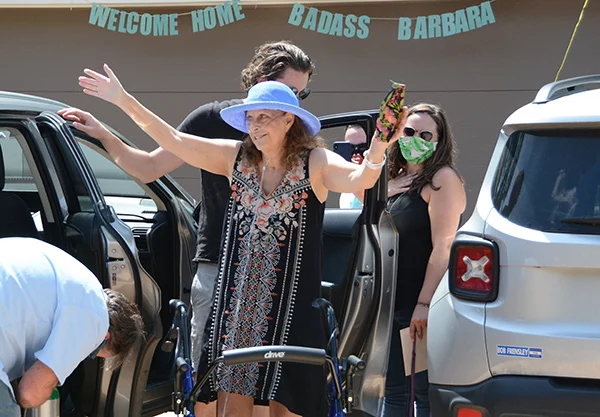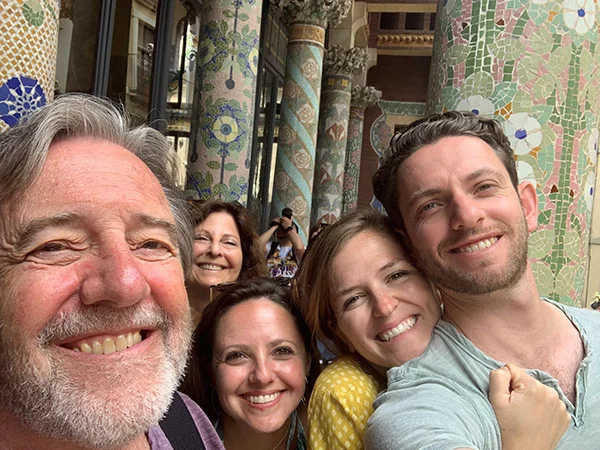
The welcome-home posters hung just over the wraparound front porch at the house in Boulder.
“We love you higher than the sky, deeper than the sea, greater than the universe,” said one sign.
“You’re home! You Rock!” and “Barbara beat COVID,” said others.
Colorful chalk on the sidewalk chronicled the remarkable journey: 65 days on a ventilator, three months and one week in hospitals and 15 days on an artificial lung system called ECMO.
Back when Barbara Gould, 64, got sick and had to leave home, the spring flowers were just poking up through the dirt. The nearby foothills north of Boulder were green. Now a hot, dry summer had turned them brown.
And finally, Barbara was home.

Family, friends, neighbors and members of her synagogue had prayed for her throughout the ordeal. Now about 50 of them greeted her with a surprise homecoming celebration.
Barbara’s husband, Allen Taggart, steered the car into the driveway, breaking through a streamer attached to a sign that said, “finish line.”
Barbara stepped out, took a few steps on her own, then sat to rest on the bench of her walker, surveyed the crowd and absorbed the healing love emanating from them.
She placed her hand over her heart, smiled and thanked them.
“You saved my life and I know it,” Barbara said.

Asked how it felt to be home, she said, “It’s magnificent. To feel the love and support is so strengthening. It’s the power of community. I believe that it, along with the doctors, saved my life and saved my family.”
A spontaneous chant erupted.
Barbara’s rabbi, Fred Greene, and others said a prayer in Hebrew called the Shehecheyanu.
Barbara grinned and joined in.
“It’s a prayer for new beginnings and special occasions,” said Betty Vanderlinden, a friend of Barbara’s. She choked on emotion as she talked.
“This is what we prayed for. We just couldn’t stand the thought of her not coming home. She’s a giver and a very loved woman.”
A medical ‘Hail Mary’ to survive COVID-19
All of her life, Barbara has cared for others.
She was only 22 when she helped open Boulder’s Safehouse for women coping with domestic violence. She earned a degree in social work and helped resettle Soviet Jewish refugees. For many years, she worked at her synagogue, Congregation HarHashem in Boulder, to help interfaith families and families coping with grief or loss.
“She’s the kind of person who has spent her life giving to others and taking care of others. She is absolutely the most empathetic person I have ever known. She feels others’ pain, sorrow and loss in ways I cannot fathom,’’ said Gould’s husband, Allen, a 68-year-old retired lawyer.
Barbara wasn’t used to needing help herself.

Then, she got COVID-19. As her illness became worse and worse, she had to depend upon countless folks from doctors to nurses to chaplains and palliative care experts.
Barbara ultimately needed caregivers at two hospitals, an emergency helicopter ride from one hospital to the other, rehabilitation at two facilities and those 65 days on a ventilator – three times as long as the average COVID-19 patient at UCHealth University of Colorado Hospital (UCH).
She also benefited from a medical “Hail Mary.” When she wasn’t improving on a ventilator at her hometown hospital, Barbara’s doctors at Boulder Community Health sought help from other area hospitals. They hoped to find a team that could give Barbara’s lungs a rest through a procedure known as ECMO, which stands for extracorporeal membrane oxygenation.

The kind she needed is known as “venovenous ECMO.” Doctors place large tubes in the patient’s neck or groin and direct the tubes into the heart. The tubes bring blood out of the heart, then through an oxygenator and back to the heart to be pumped to the body. ECMO does the “work of breathing” thereby giving a person whose lungs are failing a chance to recover.
One Denver hospital turned Barbara’s caregivers down because she already had been on a ventilator for more than a week.
Preliminary studies from China and Italy showed that many COVID-19 patients who received ECMO did poorly. For medical experts elsewhere, this was an alarming finding since ECMO had worked well during previous pandemics, including the H1N1 flu.
The team at University of Colorado Hospital had to consider Barbara’s circumstances carefully before accepting her.
Dr. Jessica Yu Rove, a cardiac surgeon and assistant professor at the University of Colorado Anschutz Medical Campus, spoke with Allen and made the call.

Yes, Barbara was older than most patients considered for ECMO therapy. And, at that point, she had been on a ventilator for 15 days, well past the period thought to be critical to boost the chances of recovery.
But, aside from the lung damage, Barbara’s other organs were holding up well. Many critically ill COVID-19 patients also suffer severe kidney and heart damage as the virus wreaks havoc on their bodies. But Barbara’s heart was strong – both literally and metaphorically – and she never needed dialysis.
Rove and the team agreed to the transfer, and that’s when Barbara took an emergency helicopter from Boulder to Aurora.
“It was a long shot but we considered her individual case and had to do what was right for her at the time, which was to give her a chance,” Rove said. “We have to be very forthcoming with families. I could not promise Allen that she was going to live. I said that ECMO would be her Hail Mary.”
‘It’s going to be OK’
Back before U.S. health experts knew there were any cases of the new coronavirus in Colorado or very many other places around the world, Barbara and Allen had gone on a cruise.
“Barbara’s happy place is on the water. She’ll be on deck to see the sun come up. She’ll be on deck until it sets,” Allen said.

The couple had enjoyed a cruise in South America from mid-February through mid-March. They returned home to Boulder on March 17. No one else on their trip got sick, so they theorized that perhaps they had picked up the virus on the plane home, during a layover in Atlanta or perhaps on the ride home from Denver International Airport.
Both got sick, but at first it didn’t seem too bad. Barbara was coughing, but that was typical for her. Whenever she got a cold, it settled in her chest. Allen had digestive issues, chills, fever, and fatigue. Neither could get a test for COVID-19, but they presumed they both had it.
Then, their paths diverged.
“As dad got better, mom got worse,” said their daughter, Rebecca Taggart, 33, who followed her mom into a helping profession. She’s a special education teacher in the Adams 14 school district.
By early April, Barbara knew she needed help. On April 7, she told Allen that she was struggling to breathe and something wasn’t right.
“That was the first time she was feeling scared. Our family is very, very close. We’re always texting and talking,” Rebecca said.
Barbara went to her primary care provider at Boulder Internal Medicine. Dr. Bill Blanchet, in consultation with Barbara’s regular provider, physician assistant, John Campbell, sent her straight to the hospital in Boulder.
Allen couldn’t take his wife inside.
“I kissed her on the forehead on the sidewalk in front of the hospital and wondered if I would ever see her alive again,” Allen recalled.
As usual, Barbara provided reassurance.
“It’s going to be OK,” she said.
Unfortunately, for many weeks, it was not.
ECMO results in Colorado: dramatic lifesaving outcomes
There were ups and downs throughout Barbara’s treatment, but the ECMO ultimately worked and she is now part of a forthcoming research study showing that critically ill patients with the coronavirus can indeed do well on ECMO. Nearly all of the COVID-19 patients at UCH who have had ECMO have survived. Barbara’s doctors will soon share their findings in a medical journal so other doctors dealing with spikes in cases of COVID-19 around the U.S. and elsewhere in the world can boost their survival rates.
“It’s absolutely incredible,” said Dr. Breandan Sullivan, another expert on Barbara’s team.
He’s an anesthesiologist and an Intensive Care Unit (ICU) doctor. He’s co-medical director of the cardiothoracic ICU where Barbara received ECMO. Sullivan is also one of the authors of the study and is an associate professor at the University of Colorado School of Medicine.
“It just gives us so much hope. I think it’s not a matter of if, but when, we’ll see another surge in Colorado. Because of Barbara and how well she did, we will be able to offer this treatment to others,” Sullivan said.

What’s remarkable is how different the results were in Colorado compared with other parts of the country and the world.
“We have had this dramatic life-saving experience,” Sullivan said.
He attributes the success with ECMO here to teams that were not overwhelmed and had the expertise, energy and perseverance to safely treat COVID-19 patients with ECMO.
“We also reserved this (treatment) for patients who had the greatest likelihood of success,” Sullivan said. “Some patients have lungs that are scarred and will never recover.”
Thankfully, that wasn’t the case with Barbara.
A new ECMO technique: ‘proning’
When Barbara arrived at UCH, her team was trying something that they’d never done with ECMO patients in the past. Around the world, doctors have learned that COVID-19 patients do better lying face down. In that position, gravity makes it easier for the lungs to exchange oxygen. The technique is called “proning.” But no one at UCH had ever tried it with patients on ECMO, which is already a complex procedure.
Surgeons place the tubes, known as cannulas, into large veins or arteries. The ECMO pump then pulls blood without oxygen into the machine’s artificial lung. The machine allows the patient’s lungs to rest and adds oxygen to the blood, warming it before pumping it back into the person’s body.
Specially trained nurses, advance practice providers and doctors need to monitor the patient around the clock in case anything goes wrong.
Flipping patients requires six people and adds additional risks. Nonetheless, the team gave it a shot. The team proned Barbara for 18 hours, then put her on her back for six, then flipped her to her belly again. They continued the proning maneuvers for several days.
An urgent call for prayers
At first, Barbara didn’t seem to improve.
By this time, Rebecca and her brother, Sam, 30, who lives in Nashville, Tenn., had both moved back in with their dad at their childhood home.

They’d begin each day by getting a phone update from the morning nurse. Then in the afternoon, they’d speak to Barbara’s doctors. Just before bed, they’d talk to the night nurses.
They scoured the news for stories that gave them hope, like other patients who had been on ventilators for over a month and were surviving. They reached out to a friend’s daughter, a doctor working at Massachusetts General Hospital, who could bring them up to speed on medical advancements. They learned to advocate for Barbara.
Allen sent out daily updates to friends, who in turn shared them with many others.
One update in early May followed some dispiriting news. Allen sent out a last call for help on May 5:
“Friends, the doctor let us know today that Barbara’s time on the ECMO has not helped her lungs as much as had been hoped. They will try a couple more interventions over the next few days to see if she can improve enough to get off the ECMO. However, if the lung compliance still hasn’t improved, there will be nothing more they can do to save Barbara’s life. Prayers and healing thoughts please. Time for a miracle,” Allen wrote.
At Barbara’s synagogue, members were holding virtual prayer vigils. One gathering included 200 people. As news of Barbara’s dire condition spread, so did prayers, from friends to friends of friends and from Colorado to Tennessee and Rhode Island.

The palliative care team stepped in to offer more support. They wanted to know more about Barbara as a person. Along with travel and devoting herself to friends and her community, she and Allen loved music. Every morning, they sat together in the front room of their home where the sun spills in through the windows. They loved sipping their coffee and reading the news together on their iPads.
Allen’s hope when Barbara recovered was to enjoy this simple routine again.
“This sounds corny, but I just wanted to sit next to each other like we always have,” Allen said.
Music therapist, Angela Wibben, who works with the palliative care team, loaded some music on an iPad for Barbara to bring a taste of home to her. Then the family hatched a plan to provide music more often. Why not send Barbara’s own iPad to her? Rebecca and Sam created a special “Barbara’s Recovery Playlist” with all of their mom’s favorite music so it could stream for her in her room. Thanks to nurses, the family also did multiple FaceTime visits.
Prayers answered and a safe landing
Just a day after Allen sent out his urgent plea for prayers, a crazy thing happened. Barbara had a dramatic turnaround.
Dr. Maung Hlaing delivered the good news to Allen, Rebecca and Sam.
Other patients on ECMO have had similar experiences.
“With Barbara and a bunch of others, we saw dramatic improvements, patients literally turning around overnight,” Sullivan said. “One day, we were telling the family, ‘I don’t think your family member is going to survive.’”
The next, they were delivering great news.

“This is one of the most remarkable recoveries we’ve seen,” Sullivan said of Barbara.
The family took to calling Dr. Sullivan “Sully.” Like Chelsey “Sully” Sullenberger, the pilot who safely landed a doomed plane in the Hudson River, Dr. Sullivan and fellow caregivers were delivering Barbara to safety.
“It was an amazing team effort,” Sullivan said.
He’s now working with colleagues at Boulder Community Health and other hospitals that don’t have ECMO programs. Sullivan and his team would like to offer the treatments as soon as possible to any COVID-19 patients whose lungs need a rest. UCH has the largest ECMO program in the Denver area, Sullivan said.
After getting treated at UCH, Barbara received critical care at Kindred Hospital Aurora, a transitional center where caregivers helped wean her from the ventilator. Then, in a move that brought her nearly full circle, Barbara finished her inpatient treatments at UCHealth Broomfield Hospital’s rehabilitation unit, a joint venture of UCHealth and Boulder Community Health.
“It’s an incredible journey. This is someone who otherwise would not have made it,” said Rove, the doctor who green-lighted Barbara’s ECMO treatments.
“It’s a long, long road. She really did all the work. I cannot emphasize how hard it is. These patients have to learn to sit up and walk again,” she said. “The credit goes to Barbara herself.”
Her family and her community also played a key role.
Allen has always believed more in logic than the power of prayer. But, he finds himself in awe of his family’s experience.
“I don’t know what to think. I do believe that the positive energy, prayer, good vibes and collective love found its way from many, many people who we don’t even know to Barbara,” he said.

Rebecca has marveled at how many people her mom has touched, who in turn, kept her alive.
“Even in the darkest moments, I felt in my bones that she was going to be OK,” Rebecca said. “I want her at my wedding, at the birth of my children. I want her to have grandchildren.”
And Sam is so grateful to the team that cared for his mom that someday, when he and his wife, Amanda Capers, have children, they just might name one of them after Dr. Sullivan.
“He kept hope alive for us,” Sam said.
“This whole experience has completely rattled my belief system. I’ve never been a ‘thoughts and prayers’ kind of guy. To me, that’s always felt a little empty, but the outpouring of love and hopeful prayer was unbelievable.”
And, he was stunned when his mom rebounded within a day after his dad put out a call for help.
Says Sam:
“It’s nothing short of a miracle.”
